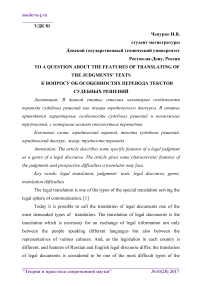To a question about the features of translating of the judgments’ texts
Автор: Chepurko I.V.
Журнал: Теория и практика современной науки @modern-j
Рубрика: Основной раздел
Статья в выпуске: 10 (28), 2017 года.
Бесплатный доступ
The article describes some specific features of a legal judgment as a genre of a legal discourse. The article gives some characteristic features of the judgments and prospective difficulties a translator may face.
Legal translation, judgments' texts, legal discourse, genre, translation difficulties
Короткий адрес: https://sciup.org/140289356
IDR: 140289356
Текст научной статьи To a question about the features of translating of the judgments’ texts
The legal translation is one of the types of the special translation serving the legal sphere of communication. [1]
Today it is possible to call the translation of legal documents one of the most demanded types of translation. The translation of legal documents is the translation which is necessary for an exchange of legal information not only between the people speaking different languages but also between the representatives of various cultures. And, as the legislation in each country is different, and features of Russian and English legal discourse differ, the translation of legal documents is considered to be one of the most difficult types of the translation of the text. In general, the documents can be divided into two core groups: corporate documents and documents of individuals. Among them are passports, testation and certificates, constituent documents of the organizations, contracts, contracts, agreements, etc. [2] However the translation of judgments in system of genres of legal texts takes a specific place. For the correct translation of judgments and preservation of its operating characteristics a translator has to know the specificity of the text of this genre.
The purpose of judgments as a genre is "removal of a certain unspecified verdict, the solutions on a certain question". [3]
Concerning characteristic linguistic properties, I.D. Zaytseva points out the following characteristics of a genre: objectivity (it is shown in a lack of the emotional colored lexicon, the direct speech, interjections, particles, exclamatory and interrogative constructions), accuracy (it is expressed in a lack of synonyms, frequent usage of lexical repetitions, usage of special terms, the use of complex sentences), infinite character of a statement, standardization (usage of steady turns of speech and standard construction of documents), usage of terminology, bureaucratese, lexical-phraseological units and clichés.
The composition is the obligatory characteristic of judgments’ texts, as well as other texts of any genre. It assumes the usage of such means as semantic constituents, structural units and particulars. The composition of any judgments includes: introductory, descriptive-analytical and final part.
However, dealing with the official translations of judgments it is not always possible to observe unity of the translations of one or another terms and realities. So, for example, the headings of large parts of judgments don’t cause inconsistency. Formulations of introductory clause and operative part are universal in the original and in the translation.
Another feature of the translation of judgments is a large number of references to various international documents. It means that in the presence of such references and quotes from them, the translator surely has to be guided by already published official translations of the specified documents.
As practice of courts of some countries, and also the European Court of Human Rights, is decisional, references to the previous affairs according to which the relevant court has already passed the judgement occur in judgments’ texts.
Considering the case and referring to any given precedent, the Court can either sum up already considered question, or quote the precedent. In that case, for the correct translation the translator needs to find this precedent in source language and its official translation on the native language if such translation is available.
For the translator realities represent no less difficulty. So, the large number of different names of various instances, appointments, regulatory legal acts of this country, judicial reviews, and also geographical names and names of the persons participating in judicial examinations can occur in judgments’ texts. For the correct translation of realities the translator has to have background knowledge of legal system of the country, the judgment’ text which he/she translates, judicial hierarchy of this country, the organization of an execution of the punishment, etc.
At the translation of judgments the translator deals not only with texts of precedents, but also with legislative texts. That’s why he/she needs to have a clear idea of compositional special aspects and characteristic linguistic properties of this genre.
Judgments’ texts are distinct in presence of a large number of terms. Plus, this terms not only legal, but also the terms relating to the sphere of object of dispute. So, the translator deals with the translation of terminology which can refer to any sphere of the human relations. In this case the translator must also get acquainted with the sphere of functioning of this terminology.
In general, the translation of judgments is rather laborious work because it demands skill to apply the long-present translation equivalents from official documents and skills to make the translational decisions which are based on the knowledge of characteristics of the practice of the court. The professional work at the translation of the judgement of this court and its genre features.
Список литературы To a question about the features of translating of the judgments’ texts
- Kinderknecht, А.S. To a question about the difficulties of legal terminology translation// Science notes of Orel State University. 2013. №2 (52)
- Umerova, М.V. Peculiarities of translation of documents and official texts// Topical problems of arts and sciences. 2011. №12
- Zaytseva, I.D. Discourse attributes of genre of resolution.: thesis abstract of the candidate of philological sciences. - Barnaul, 2011. - 20 p.
- Borisova, L. А. The composition and language features of the statute as a sub-genre in the English legal discourse: thesis abstract of the candidate of philological sciences. - Voronezh, 2010. - 23 p.


